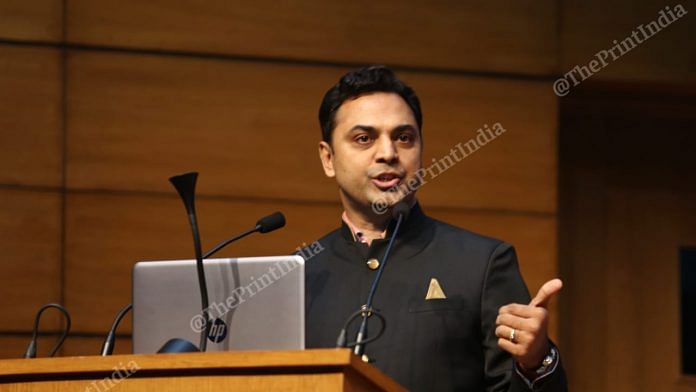New Delhi: Covid-19 may have wrecked economies across the world but its impact hasn’t been as strong as the global financial crisis (GFC) of 2008, asserted K.V. Subramanian, the former chief economic advisor (CEA) of India.
He also noted that people tend to ‘overreact’ to certain short-term situations in India, alluding to the country’s response to inflation, unemployment and growth — three enormous problems the economy is currently battling.
In conversation with ThePrint’s Editor-in-Chief Shekhar Gupta, during a virtual session of ‘Off The Cuff’, Subramanian laid out facts to prove his point about the economic implications of the pandemic not being as severe for India compared to the 2008 financial crisis.
“Compared to the previous crisis, India had double-digit inflation for one and half years. Till December 2021, during the Covid crisis, the inflation rate averaged 5.6%. The current account deficit was close to 5% in contrast the surplus (this time) was 0.9%. Fiscal deficit compared to peer economies was two and a half times during the global financial crisis, now it’s 90%,” he said.
Subramanian also added that the rupee value during the Covid crisis was also relatively stable to the figures during the GFC.
“If you look at currency depreciation, almost 60% during the GFC, now (during Covid) it’s just 0.06%,” he said.
The former CEA’s estimates were based on calculations for the ‘Covid-19 period’ which he counted from March 2020 to December 2021 and then measured the percentage change in rupee-dollar value. In the same manner, the change in currency value was calculated for the GFC period (the timeframe was not specified during the conversation).
Elaborating on his argument, Subramanian, who is currently a professor at the Indian School of Business, stated the economy during Covid-19 was also cushioned due to heavy capital expenditure which he believes has ‘multiplier effects’.
“Capital expenditure increased by 13.5% during the Covid period. In contrast, if you look at the GFC, capital expenditure declined by 5%. You also have revenue expenditure increasing by 27%, as a result, capital formation during the GFC decreased by 4.5% and now it has increased by 2.5%.”
Subramanian noted that comparing the two crisis periods provided a fair assessment of the policy steps taken in those times while underlining that a government’s capability is defined by its response to a crisis.
“Steps taken during the crisis exhibit the capabilities of the government, the depths of its economic thinking and intent. I don’t think this is all visible during normal times,” the professor stated.
Comparing the economic policy measures India took during Covid to those during GFC, the economist remarked that the country would have faced harsher impacts if the steps taken at the time of the global financial crisis were applied.
“If India had done the same policy steps as the advanced economies now or what we did during the global financial crisis, we may have had four times as much inflation, two-and-a-half times fiscal deficit, macro fundamentals which had been very very poor, would have been a part of the fragile five economies”, he said.
Currently, India’s retail inflation is above 7% and shows an upward trend. Meanwhile, the rupee has hit a lifetime low of Rs. 77.41 against the US dollar, but most of it happened outside the purview of the peak Covid-19 period.
Also read: Under fire for spiraling inflation, Modi govt announces excise duty cut on fuels, LPG subsidy
Pre-pandemic slowdown
When pointed out that the growth rate of the Indian economy was moving downwards even before the pandemic, Subramanian criticised the ‘crony lending’ of the past, saying its ‘cascading effects eventually led to a slowdown’.
“When a crisis starts in the financial sector, the impact is felt for a much longer duration, even if the crisis has passed,” he stated.
“If you recall the crony lending that was done up till 2013, and this kind of lending has never ever happened in independent India… Why is the overhang so long — because banks don’t want to accept and continue giving loans saying everything’s alright. If you look at the overall credit itself, over 20% of it is grouped, mostly because of crony lending, the cascading effects of which eventually led to a slowdown,” he said.
When asked about the situations prevailing today — higher inflation, unemployment and slow growth, Subramanian observed that India overreacts to certain short-term situations.
“In India, we tend to overreact on both sides, when things start getting better we start saying – Oh! heaven has arrived and when things go a little down we say all hell has broken loose. The reality is often in-between,” he noted.
Subramanian concluded that India is still likely to grow fast, considering that the war between Russia and Ukraine will lead to a slowdown in the global economies.
“In 2022, the global economies are expected to grow around 2-3% and may even slow down if the war between Russia and Ukraine persists – but at the same time, India would grow at 8%,” he claimed.
Also read: Modi govt won’t borrow extra this year to fund tax cuts, inflation target to stay at 4%



